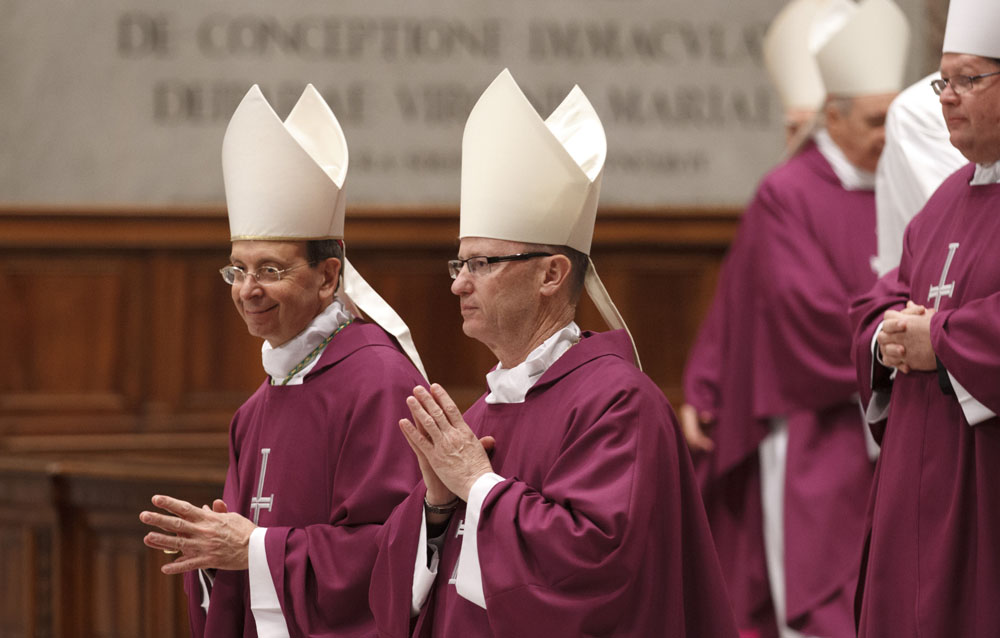
Archbishop William Lori of Baltimore, Bishop James Conley of Lincoln, Neb., center, and Archbishop Gerald Lacroix of Quebec, at St. Peter's Basilica at the Vatican, in a 2012 file photo. (CNS/Paul Haring)
Story updated Jan. 24 at 1:55 p.m., CDT, with comments from Call to Action Nebraska.
The national Call to Action office lent public support Tuesday to its excommunicated members in Lincoln, Nebraska, and the recent dialogue with their bishop that has presented a possible breakthrough in ending their censure of now more than two decades.
At the same time, it called for Bishop James Conley of Lincoln to lift the excommunication order of its members in his diocese "immediately and without condition."
The statement from the national church reform group came a month after Conley wrote to members of Call to Action Nebraska with an offer to rescind the excommunication of its members on an individual basis, while letting stand the blanket excommunication of the organization, along with 10 other groups in the diocese.
That offer resulted from a series of five meetings among Conley, two diocesan officials and five members of Call to Action Nebraska who over the course of the last 16 months discussed the group's excommunication — levied in May 1996 by his predecessor Bishop Fabian Bruskewitz, who declared membership in the censured organizations "perilous" and "incompatible with the Catholic faith."
The dialogue sessions resulted in Conley putting forth a proposal to rescind the excommunication in the cases of individual Call to Action members who agreed to meet with him as a group to discuss the censure, and afterward to recite together the Nicene Creed and the Easter Vigil affirmation of faith.
"Members of CTA/Nebraska should not have to go through any sort of special process in order for Bishop Conley to recognize their rightful place in the church," the national office said in its statement. "However, Call To Action has always supported the right of our members to follow their conscience. If they choose to engage in this process with Bishop Conley they have our full support."
Rachel Pokora, one of the Call to Action Nebraska members who met with Conley, told NCR in an email Wednesday that she is grateful for the support from the national office and that she and her fellow dialogue participants "have not wavered in our belief that the right and best thing to do is overturn the excommunication legislation." At the same time, she said the bishop made clear he was not prepared to take such a step.
"This leaves each of us to prayerfully discern how we will respond to Bishop Conley’s offer," Pokora said, adding she holds out "sincere hope" he wold consider abolishing the excommunication order in the near future.
It remains unknown how many members of Call to Action Nebraska remain impacted by the excommunication or how many intend to accept the bishop's offer, with a number of members having never viewed the censure as valid. Several of the members who met with him, including Pokora, have said they plan to go forward with the proposal.
"This is something we say at Mass at Easter. Why would I not say it now?" Nancy Lueking, president of Call to Action Nebraska, told NCR in early January.
Lueking and the other four members, all women, who met with Conley said they were pleased with the understanding they reached, and regarded as essential the dialogue process in order to address impasse and the pain caused by the excommunication. Their conversations began in September 2016, with the final session taking place Dec. 12, the same day that Conley addressed a letter to all members of the group explaining his offer.
In its statement, the national Call to Action congratulated the Nebraska chapter for its work in building a relationship with Conley and also thanked the bishop "for his willingness to be in dialogue with our members, and to work toward reconciliation and healing."
The national office went on to praise its members in Nebraska who "have shown an incredible amount of faith and courage as they faced this injustice."
"This excommunication should never have happened. Excommunication should not be used as a fear tactic, or as punishment for speaking out against injustice," it said.
Excommunication is the most severe censure under canon law, and prevents a person from receiving the sacraments or holding ministerial roles in the church. Persons under excommunication however, are not considered kicked out of the church and can continue to attend Mass, though are to refrain from receiving Holy Communion.
In the case of Lincoln, the excommunication is confined to diocesan boundaries, meaning that its enforcement is not recognized in other dioceses. While other bishops have spoken against Call to Action throughout its history — the organization has been a strident advocate for women's ordination, increased lay empowerment in the church and LGBT rights, including same-sex marriage — no other U.S. diocese has followed Bruskewitz in taking the step of excommunicating its members.
[Brian Roewe is an NCR staff writer. His email address is broewe@ncronline.org. Follow him on Twitter: @BrianRoewe.]
Advertisement







